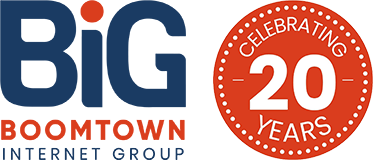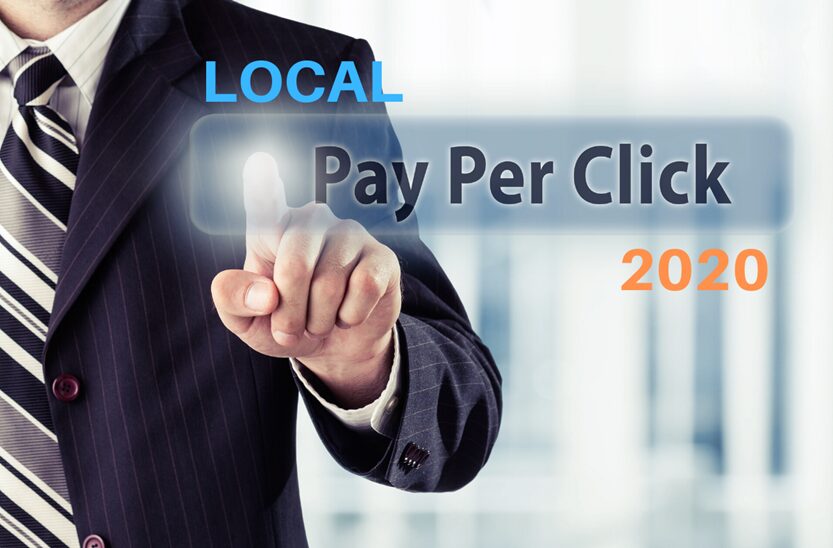If you have a local business that counts on foot traffic to your storefront, a local PPC campaign can generate targeted leads that bring people into your doors. The best part about local PPC is that the cost per click will be lower than a national campaign. The competition is less, and the specific area works to geo-target searchers, bringing you better-qualified leads at a lower cost. If you have not had good luck with local PPC campaigns in the past, you may want to see if the tools and tricks for local PPC in 2020 will improve your results in the future. Sometimes refining a campaign can make all the difference!
What are the Benefits of Better Local PPC for 2020?
Local PPC provides:
- Better and more plentiful leads and calls
- More store visits
- A way to showcase your positive reviews increasing local trust
- A way to upstage your competition by using the latest technology like Google Assistance, Alexa, voice search, etc.
- Cost-effective marketing
- Local brand awareness
- Cost-effective conversion optimization
Who Benefits from Local PPC?
Any business with a local presence and wants to target local customers will benefit from a local PPC campaign in 2020. Local Pay-Per-Click (PPC) advertising showcases your listing at the top of Google search results for phrases you specify. Unfortunately, the cost of PPC can put off many small business owners. It is important to keep in mind that you only pay for the clicks on your ad. Since local PPC is regionally based, your cost exposure is only around other businesses in your area, which tends to make it much more affordable for small, local businesses.
It isn’t only local businesses that run local PPC campaigns. There may be a company that services the entire world but also understands that several local markets are underserved and focuses a geo-targeted local PPC campaign in those areas. Therefore, any business that depends on local traffic should be running paid ads.
What Options are Available for Local PPC?
It is important to set a strategy before starting any advertising campaign, identifying the potential ads networks to use, and realistic goals to set in order to determine campaign return on investment (ROI). Many small businesses have small marketing budgets, so it is important to start by selecting the right ads platform. This generally depends on the business offerings. If the business offers products or services that are lower priced and target the consumer, Facebook local advertising may generate qualified leads for a low price, but the lead conversion rate may be low. Other good options for this type of business would be local Google or Bing ad campaigns. Every available local lead advertising media should be evaluated.
Types of Local PPC Networks Available and Selection Tips
| Local PPC Network | Tips |
| Local Google PPC | Search ads for any budget |
| Local Bing PPC | Search ads, smaller audience than Google but worth trying |
| Local Facebook Ads | Lower PPC costs, great for branding, may have fewer conversions |
| Local Instagram Ads | Great for visual products that target consumers |
| Local YouTube Ads | Lower costs and can bring in traffic, lower conversion rates |
| Snapchat Geofilters | Create brand awareness and are helpful if you are hosting local events |
| Local Remarketing on Google and Bing | Great for brand recognition |
| *Ads that are triggered by local weather conditions can also be useful for local businesses | |
Ways to Improve Local PPC for 2020
Use Hyper-Local Campaign Targeting and Reviewing Margins on Services
Set up campaigns based on geography so that you can allocate more budget to campaigns that provide better ROI. Perhaps, in a certain location, the price for leads is too high for a profitable conversion rate. It may work better to have one campaign for areas that are near or next to each other. You can set up campaigns by zip code, town or city, neighborhood or even a custom radius around your business. You can also set up negative words to prevent ads from showing in areas you deem too competitive or otherwise will yield a poor ROI. You may try using zip codes in the ad copy and even the URL that is displayed on the ad. Additionally, local ads can target specific audiences, specific devices, and specific demographics, which help to hyper-target searchers.
Another way to get hyper-local is to set up a single ad group for each keyword phrase, which allows you to tailor ads specifically to a very small location and audience for very relevant ads. As an example, if you target “Pediatric Dentist in <county>” your ad group and ad could read something like:
Campaign: Name of County
Ad Groups: Pediatric Dentist, Dental Cleanings, Dental X-Rays, Fluoride Treatments, Emergency Care, Dental Fillings
Ad Example: Pediatric Dentist in {County} near you!
They look like this:
Campaign: <County Name>
Ad Groups: {Town 1}, Town 2, Town 3, Town 4
Ads Examples: Pediatric dentist in Town 1 near you! Dental Cleanings, Dental X-Rays, Fluoride Treatments, Emergency Care, Dental Fillings
Set up Campaigns around Services Which Offer the Best ROI
If the services you offer return very different revenue (or margins) your campaigns should focus on the services with the best ROI, and you may even want to prevent ads from showing up for some services by adding negative keywords. For instance, you may not want to run a campaign for products under a certain dollar figure because the ad costs prevent you from breaking even. It makes sense to remove these products from your campaign spend and refocus your marketing dollars on products or services that have better margins.
Use Local Extensions

For every location, you should ensure that you have claimed and optimized your Google My Business listing and link it with your Google Ad account. This will allow you to add additional ad placements and extensions. You can do the same thing with Bing Ads and location extensions, but you don’t have to claim your Bing listing to run extensions. Extensions are extra features on ads like a phone number that reportedly boost click-through rates an average of up to 15% and can really expand the amount of Google’s search real estate that your ad takes up. There are several available local extensions that can boost clicks to your ads:
- Call Extensions allow people to click your phone number on the ad and have it ring through to your business phone. If the person searching isn’t on a mobile device they will still see the phone number.
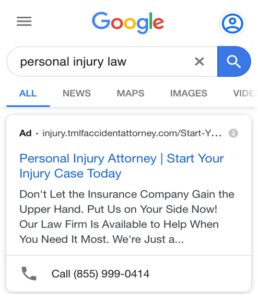
- Message Extensions are used so that people on mobile devices can send text messages to you, right from the ad. You will need to use a phone number that is able to receive and send text messages on your ad, although there is the ability to respond via email that shows up as a text on the user’s phone.
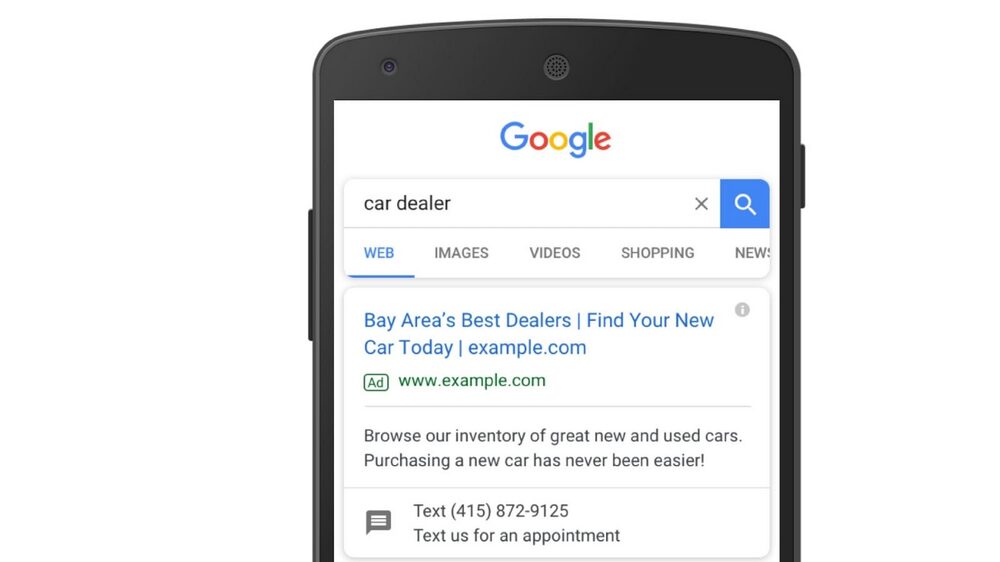
- Structured Snippet Extensions showcase products and services, brands, courses, and location destinations. Google’s available structured snippets are shown here.
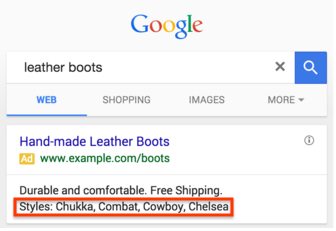
- Sitelink Extensions are not necessarily local, but you can use them to point out up to eight links on the page that can by hyper-local landing pages.

- Callout Extensions can be used to highlight things that make your local business super special. You can have up to 10 callouts featuring things such as open after hours and on holidays, or that you offer the lowest prices in your county, state or town.

- Price Extensions are only appropriate for eCommerce stores with a physical location or to highlight the prices of your services. Clicking on one of these extensions takes the user to a place on your site where you can order services or purchase products.
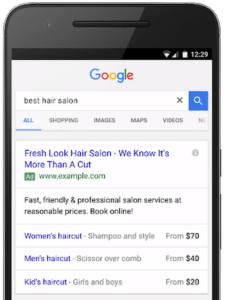
- Location and Affiliate Extensions show users where to get your products and services and other affiliated locations that also sell or supply them.
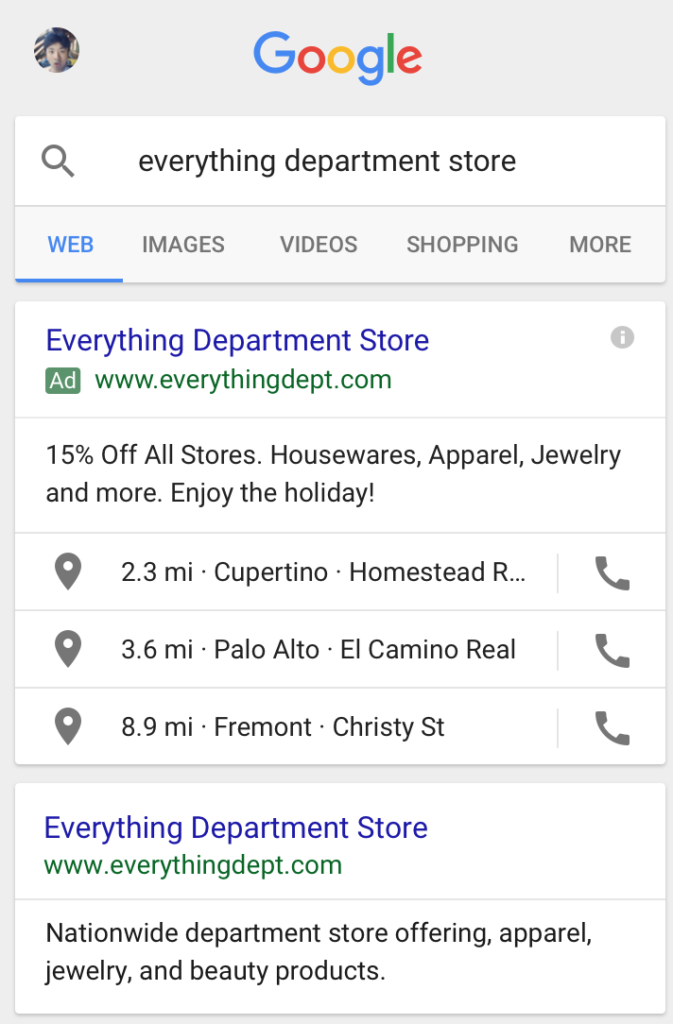
- App Extensions allow users to click through to an app store to download your app. This is not useful unless you have a local app in this context.
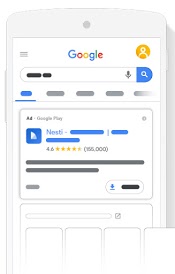
- Promotion Extensions allow you to showcase deals you are running. You may have some local deals you really want to feature in your ads.
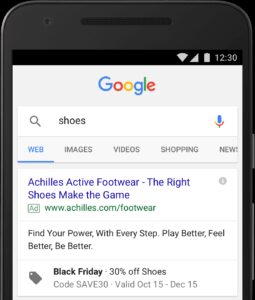
Make sure Landing Pages Convert and are Targeted for Better Quality Scores on Ads
Local landing pages need a measurable call to action like a single clickable mobile number, form above the scroll, or other action that can be tracked. This way you will have a much better idea as to whether your campaigns are working and bringing you a tangible ROI. A landing page should instantly instill trust by including local awards, local business images, real photos of customers and employees, and some text that backs up the local statements in your ads. The more your ad mirrors the content of the landing page, the higher its quality score and the more likely Google or Bing will show the ad and a searcher clicking through to the landing page will convert from a lead to a customer.
Are Local Pages or Local Domains Better for Local PPC?
If your business name has a local connotation like CityNamePizza.com you won’t have the ability to create landing pages for other locations. For instance, CityNamePizza.com/smalltownnamepizza/ is confusing. While this domain may be ultimately better for SEO, PPC does not require it or favor it in any way.
Use Google Local Campaigns and Search Partners
Local campaign ads look like location extensions but are specifically designed to bring foot traffic to your location and are eligible to appear in Google Maps, in searches on Google Maps or Google My Business, on YouTube, and within Google’s display network of websites that use Google’s in-sight search tool.
With Google Local Campaigns you don’t create an ad. This is an AI-driven service that uses data from your Google My Business, as well as the text, some assets, and the campaign budget you set to generate your optimized ad and show it when search terms match your business and location. Visits to your store count as measurable conversions. Your GMB needs to be linked to the Ad account.
If Available, Try Google Local Service Ads
Local HVAC, locksmiths, plumbers, and cleaning services can appear at the top of local searches with an icon showing a Google Guarantee which can make your ad stand out from others and builds instant trust. You can check here to see if Google Local Service Ads are available in your area for your services.

Local Service Ads show above all the other search results. An app that lets you reply to messages, track bookings, and manage leads is available. You’ll need to reply quickly to preserve your ranking. Another thing to keep in mind about these ads is that the Google guarantee badge comes at the price of Google submitting a background check on your business entity, requiring proof of insurance for every location, and employee verification.
Make Sure Competitor Campaigns Make Sense
Obviously you can’t create a campaign group (to target exactly why your service is better) for every competitor. If you just choose a few, you can make sure your budget will still support your other campaigns. Try to choose competitors that most represent your same audience, service, and prices and that you won’t be spending money on a general keyword if it is part of their business name. Make sure to set your chosen competitor names as negatives everywhere else in your campaign.
Tracking and Remarketing
Optional Google or Bing Call Tracking
Google will allow your ads to contain a dynamically generated number that forwards to your business phone and allows you to track phone calls generated from ads. Specifically using Universal Call Tracking (analytics.js) provides a better way to review PPC data in Google Analytics. It provides the ability to view call tracking data next to other event data on the Analytics dashboard. With Universal Analytics, you have the ability to track a specific visitor for up to two years. Using Universal Call Tracking you can:
- Have a better understanding of what causes customers to call because you can see what they did before and after calling
- Create customized reports that allow you to access information from sources like phone calls, data from your customer management system, website, and other sources.
- Attribute interactions on your website that happen on different devices to one person, so you can understand how using different devices will impact whether a person calls or not.
Local PPC Inventory Ads
If you run Google Shopping Ads and have an eCommerce store, you may want to consider running Local Inventory Ads targeted at shoppers searching nearby your store on Google. Instead of taking a shopper to your store, the add lands the shopper on the “local storefront” which is a Google-hosted page for your store. The local storefront shows real-time inventory (in stock, limited availability or out of stock), store hours, whether you are open or not, directions using Google maps, and gives customers the option of “store pickup” which allows them to come to your physical store to pick up their orders.
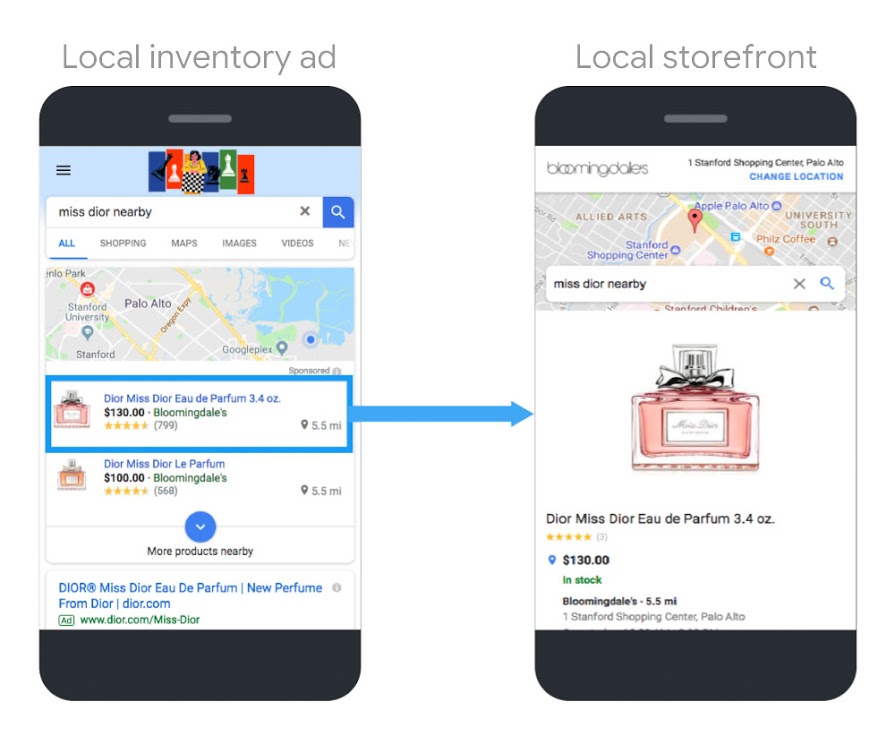
Using Local PPC Ad Remarketing

With Google Ads remarketing you can target ads to only those people who previously visited a specific page on your site and did or did not perform an action you specify in your remarketing list. You also can target users who searched for specific items on Google and Google’s search partner sites.
For instance, you may want to remarket your ad to a person who did not click into the appointment system, or who added a product to their shopping cart but did not purchase. Remarketing ads will show on the display network. You can also show ads to people who recently visited your YouTube channel.
You can also remarket to an existing email by uploading it to Google Ads as a custom audience. They will see your ads if they are logged into Gmail, YouTube or Google search.
Dynamic Remarketing is particularly useful for eCommerce customers. Using Google Analytics code and a product or service feed, dynamic remarketing ads are shown to users who have left a page of your site and meet one of the criteria you set. These ads work particularly well on mobile devices. There is also the ability to use Google’s Dynamic Prospecting tool to show ads in the same way to customers who search for your products or services.
Bing has similar remarketing programs but they are limited to five criteria for your lists. You can choose the ads to show to each list. You can upload lists that target:
- People who visited any page on your website
- People who visited a specific product on your website
- People who abandoned their carts
- People who recently purchased or filled out a form on your site
- Loyal customers
Additionally, you are able to send remarketing ads to demographics that you choose such as age, location, income, and other criteria.
Review and Revise
In digital marketing, trends change quickly, especially for local businesses. This makes it very important to create and review your procedures and results regularly, and stay abreast of all the changes relating to local PPC. Local business owners should be hyper-engaged with their ad management team to be able to pivot quickly and try new options that emerge. If you would like help creating and managing your local PPC campaign for 2020, give Boomtown Internet Group a call. The Boomtown team is an expert in PPC and certified with Google and Bing.
Review and Revise
In digital marketing, trends change quickly, especially for local businesses. This makes it very important to create and review your procedures and results regularly, and stay abreast of all the changes relating to local PPC. Local business owners should be hyper-engaged with their ad management team to be able to pivot quickly and try new options that emerge. If you would like help creating and managing your local PPC campaign for 2020, give Boomtown Internet Group a call. The Boomtown team is an expert in PPC and certified with Google and Bing.
